Menu
This article was originally written by Bill O’Neill at UNMC
UNMC and its primary clinical partner, Nebraska Medicine, continue to expand their contribution to the state’s economic success.
According to an independent new analysis, the medical center impacts Nebraskans daily — directly or indirectly — through its statewide educational programs, bioscience research and clinical services.
The med center’s economic impact topped $5.9 billion in the last fiscal year, a 34% increase since 2018, according to the report prepared by Tripp Umbach, a national consultant with expertise in economic impact studies. The current economic impact number grows to $6.4 billion annually when considering the academic-related functions (such as residency programs and research) at UNMC affiliates, Children’s Hospital & Medical Center and the VA Health System.
UNMC, Nebraska Medicine and the affiliates also supported more than 56,000 jobs in the Nebraska economy, including not only direct employment, but also indirect jobs created through the supply chain — equipment vendors, construction workers and others.
See the report on the med center’s combined economic impact here.
“UNMC and its clinical partners continue to be an important economic engine for the state of Nebraska,” said Jeffrey P. Gold, MD, chancellor of UNMC and chairman of the board at Nebraska Medicine. “As the medical center increases its already expanding national leadership role in health professions education, research and care, our statewide economic impact will increase as well, further benefiting all of the people of Nebraska for generations to come.”
Throughout the COVID-19 pandemic, the medical center’s experts and educators provided extensive education and infectious diseases expertise to Nebraskans, efforts which stretched far beyond the economic impact, said James Linder, MD, CEO of Nebraska Medicine.
“One reason that the medical center continues to have such a beneficial economic impact on the state is its devotion to health care,” Dr. Linder said. “As medical center experts worked to keep fellow Nebraskans safe and provide reliable, timely and accurate medical knowledge to the country as a whole, the stature of our partnership and the benefits it provides continue to grow.”
Among the report’s findings:
“The state has been steadfast in its support of the mission of UNMC and its partners,” Dr. Gold said. “We see through this report that, apart from helping to meet the health care needs of our Nebraska neighbors, the state’s support advances not only the health and well-being of the citizens of our state, but it provides them a positive economic benefit as well.”
Story from the University of Nebraska at Kearney
A partnership between the University of Nebraska at Kearney and University of Nebraska Medical Center, the proposed Rural Health Education Building in Kearney will further address the need for more health care workers in the state’s rural areas.
The Rural Health Education Building would build upon an existing partnership between UNK and UNMC that’s shown great success. The two institutions opened a $19 million Health Science Education Complex on UNK’s west campus in 2015, and that facility quickly filled to capacity.
The new Rural Health Education Building would allow UNMC to expand its existing nursing programs and bring new options to the UNK campus, including occupational therapy, medical nutrition, genetic counseling and respiratory care – all high-need areas in rural Nebraska.
For the first time, the UNMC College of Medicine would educate physicians in rural Nebraska, and a Master of Health Administration would be added to complement UNK’s undergraduate program.
The Rural Health Education Building would also offer professional development, training and continuing education opportunities for existing health care workers and support research that improves the lives of Nebraskans.
May 6th through the 12th is the yearly celebration of nurses during Nurse’s Week. The past year has been an extremely trying time for nurses and frontline workers across the country but it’s a perfect time to highlight the education and preparedness the UNMC College of Nursing students receive that prepares them for moments like this. Because of these, we sought to give a few students the opportunity to speak to why this past year has solidified their reasoning to pursue this career path and the responses were nothing more than inspiring.
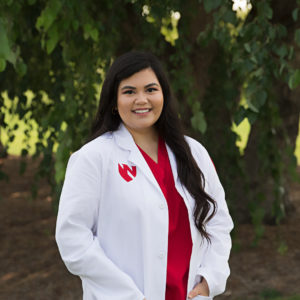
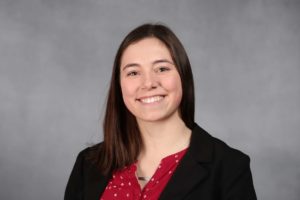
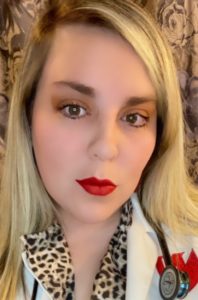
“After continuously seeing the devastation of COVID-19 this past year, my desire to become a nurse has strengthened tenfold. I studied harder than I ever had and made sure there would be nothing standing in the way of me walking the stage to get my BSN. I’d see healthcare workers on the news caring for the sick & knew that I needed to finish strong so I could get out there and help as soon as possible. I am thankful for UNMC College of Nursing – Lincoln for providing me the tools to reach this point.”
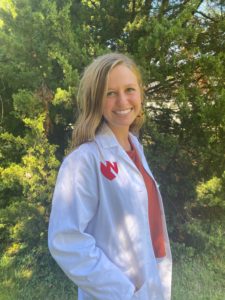
“I’ve wanted to be a nurse since I can remember. My biggest fear entering nursing school was that I would come to realize I didn’t like it or wasn’t cut out for the profession. Man could I have not been more wrong! This year has proven to me that nursing is where I belong and what I’m actually good at! I grew so much more confident in myself and my abilities through my clinical experiences and am no longer fearful, but excited to start my last year of school at UNMC.”
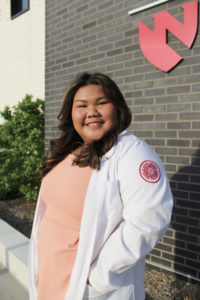
“Although everything was shutting down around me because of the COVID-19 pandemic, my passion and desire to become a nurse was only amplified. It definitely strengthened my resilience too. I had the pleasure to care for a couple of COVID patients during my critical care rotation. I have seen full recovery and families experience tremendous loss. It reminded me of how being a part of someone’s life during his or her most vulnerable time is something so special. Given the difficult circumstances with the past year, I would still choose nursing in a heartbeat.”
The Fremont Area Alzheimer’s Collaboration (FAAC) has donated a $60,000 pilot grant to go toward Alzheimer’s disease research at the University of Nebraska Medical Center. The donation marks the sixth grant the FAAC has donated to UNMC since 2014 and brings the group’s total contribution to more than $215,000.
Marv Welstead, a 98-year-old Fremont man who lost his wife, Jean, in 2009 after an eight-year battle with Alzheimer’s, is honorary chairperson of the FAAC. On Feb. 21, the Fremont Area Chamber of Commerce inducted Welstead into its Hall of Fame on his 98th birthday.
“Marv has been the driving force behind the FAAC’s success,” said Dan Murman, M.D., professor and vice chair of clinical and translational research in the UNMC Department of Neurological Sciences. “He’s been tremendously supportive. His commitment to the battle against Alzheimer’s disease is truly inspirational.”
The latest FAAC grant will support UNMC’s Alzheimer’s research in two areas – developing screening biomarkers and exploring novel treatment approaches.
Dr. Murman said the screening biomarkers include cerebrovascular measures, retinal measures, and blood and saliva samples. Each of these screening biomarkers is noninvasive and relatively inexpensive, he said. These novel biomarkers would be compared to more traditional biomarkers such as using an MRI scan to measure brain neurodegeneration or a PET scan to determine the amyloid plaque accumulation in the brain.
The grant will provide additional support for several clinical trials at UNMC, Dr. Murman said, including a study of repetitive Transcranial Magnetic Stimulation (r-TMS) as a treatment to improve memory in subjects with very mild Alzheimer’s disease. In addition, the FAAC funding will allow UNMC to recruit subjects for several new clinical trials of promising new medications.
“We can’t thank the FAAC enough for its support,” Dr. Murman said. “The ongoing contributions from the FAAC allow us the flexibility to try new things and seek new advances. We are honored to use their funding to look for answers to this incredibly difficult disease.”
A progressive, degenerative disorder, Alzheimer’s disease is the most common cause of dementia among people 65 years and older. It currently affects more than 35,000 Nebraskans and more than 5 million persons nationwide.
The money raised by the FAAC is donated to the University of Nebraska Foundation, which then distributes it to UNMC as well as the University of Nebraska-Lincoln. It is raised through a variety of channels, including a walk, a golf tournament, a bowling tournament, online gifts and memorials, Welstead said. The FAAC is a component fund of the Fremont Area Community Foundation.
“We’ve received tremendous support from the various groups in Fremont,” Welstead said. “It’s unbelievable. We’ve been getting some very generous memorials from families who have been impacted by Alzheimer’s.”
Welstead acknowledged Dan Kauble, a retired executive from Hormel who has been assisting him in raising money for Alzheimer’s disease. He also saluted Riley Faulkner, president of the FAAC, and Cathi Sampson, vice president of the FAAC.
“We love to raise money locally and then keep the money in Nebraska by giving it to UNMC and UNL,” Welstead said. “We know the University of Nebraska is doing some outstanding research with Alzheimer’s disease.”
Welstead noted that the FAAC will generate more funding through a charity golf tournament on June 23 at Fremont Country Club and a pancake feed sometime in September.
Research support
Funding from the Fremont Area Alzheimer’s Collaboration (FAAC) has assisted numerous investigators in their research. They include:
UNMC:
Daniel Murman, M.D., neurological sciences
Sachin Kedar, M.B.B.S., neurological sciences
David Warren, Ph.D., neurological sciences
Tony Wilson, Ph.D., director of the Magnetoencephalography Laboratory at UNMC/Nebraska Medicine;
Alex Wiesman, Ph.D. candidate who works with Dr. Wilson
UNL:
Greg Bashford, Ph.D., biological systems engineering
Mohammed Alwatban, Ph.D. candidate who works with Dr. Bashford